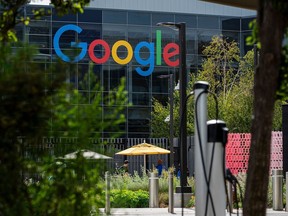Google decides not to offer publisher options in AI search

Article content
(Bloomberg) – While building Google searches using website data, Alphabet Inc.’s Alphabet Inc. admits in its internal documentation that there is an alternative way to do something: They can ask Web Publishers for permission or have them directly choose not to include it.
Advertisement 2
Article content
Article content
Article content
However, giving publishers’ choices would overcomplicate the AI model in the search, the company concluded in the document that the document was unearthed in the company’s search antitrust experiment. It says Google has a “hard red line” and requires that all publishers who want their content to appear on search pages can also be used to feed AI features. Instead of offering the option, Google decided to “update silently”, “no public announcements,” a document about how they use publisher data, written by Chetna Bindra, head of product management at Google Search. “Do what we say, say what we do, but be careful.”
Website owners relying on traffic cannot skip lists on Google, and the site still has over 90% of the search market, making it a portal to a modern web. Many people have forced Google to use its content to provide AI-generated responses to certain queries for search AI features such as AI Overview, although the feature often eats in its traffic. By answering questions directly, AI overviews can eliminate users’ need to click links, depriving sites that make money by displaying ads and selling products.
Article content
Advertisement 3
Article content
Paul Bannister, chief strategy officer of Raptive, representing online creators, said Google documents displayed in court showed that the company admitted from the outset that it was possible to provide more control for publishers.
“It’s a little annoying,” he said. “It’s clear that they know there are multiple options, and they’re almost choosing the most conservative, most protective option – a choice that doesn’t provide any controls for publishers at all.”
Google was recently tried in Washington, when a federal judge considered the steps the tech giant needed to resume competition in online searches. Judge Amit Mehta, who presided over the hearing, is now considering a range of remedies proposed by antitrust executors aimed at curbing Google’s market advantage. The final day of the testimony is May 9, with the argument ending later this month. The proposed remedy is expected to be ruled in August.
Advertisement 4
Article content
Among the options discussed in the internal company slideshow, Google lists the possibility of “SGE only opt-out only” – which allows publishers to opt-out from some of the generated AI features in Google searches without disappearing from the search engine itself. One project in the discussion will allow publishers to “opt to select their content instead of displaying it in AI” although their data “will still be used for training purposes.” Another one that Google presents as the most extreme will allow publishers to “opt out of the data it uses for grounding,” a process by which Google and other AI companies anchor models with real-world sources to prevent AI from constituting information and making it more responsive.
Advertisement 5
Article content
Google finally chooses to offer publishers new options. The presentation suggests that “No public repositioning” introduces “No new controls” that point publishers to existing options called “No summary”, and this exit allows publishers to be exempt from AI overview and other search features. Selecting this option also causes the summary of their website to disappear from the search page, making it unlikely for people to click on the link.
“Because the AI model has been built in for years of searches, publishers have always controlled how to provide their content to Google, helping them surface and attracting their traffic,” a Google spokesperson said in a statement on Bloomberg’s pilot exhibition. “This document is an early list of options in an evolving space and does not reflect feasibility or actual decisions.” They added that Google constantly updates its product documentation for online search.
Advertisement 6
Article content
Traffic on some publisher websites has dropped dramatically in the year since the launch of the AI Overview. Brooke Hartley Moy, CEO of AI startups that work with publishers, said that in the long run, it is more important for publishers to advance the development of models.
“If Google’s model achieves a reduction in the artificial elements of content, they sign their own death warrants,” Hartley Moy said at the publisher.
Recommended videos
Hartley Moy said when publishers search for new revenue streams, allowing their content to be used to retrieve enhanced power generation or rags (a technology that AI models turn it back to specific sources to provide a more accurate response) – already becoming a promising competitor. That’s why the move to get Google off the negotiation table is so important, she said.
Advertisement 7
Article content
“The rag doesn’t exist,” said Hartley Moy. “For me, it’s a strategy to ensure Google has a comprehensive market power and publishers have lost one of their key chips in the negotiations.”
Under inquiry by Google attorney Kenneth Smurzynski, the company’s search leader Liz Reid testified that creating multiple exits for different products and models would be challenging.
“This means that if the search has multiple Genai capabilities on the page that can be easily done, each search must have a separate model to power it. But we won’t build separate models for those models.”
“So, by saying that the publisher can say, ‘I want to get into this feature, but not in that feature,’ it won’t work.” “Because at that time we’re going to have to say that every feature on the page needs a different model.” Reed said that it would be very expensive not only because of the substantial investment in hardware and chips, but also because ensuring that different AI models run effectively and provide fast responses is a challenge. “This adds a huge amount of complexity,” she testified.
Article content




